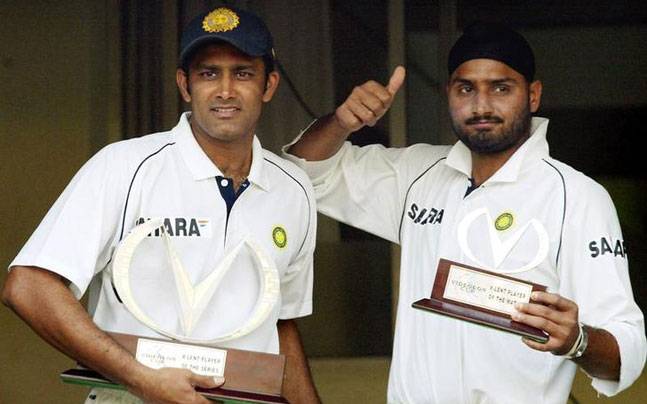In cricket, batsmen are the ones who are mostly looked at as superstars. The bowlers are appreciated and recognised for their feats, but in the end, it is the batsman who hogs the show when the pages are turned many years later.
A Test match cannot be won if the 20 wickets of a team are not taken and that itself shows how important bowlers are in the quest of a team winning. The great sides of the past may have had some wonderful batsmen, but all of them boasted of a very good bowling attack as well.
This is precisely why India has now emerged to be the top Test side in world cricket. They have a very good all-round bowling unit with good fast and medium pacers and very versatile options in their wrist and finger spinners. India’s problem at present is who amongst them to select to play in the final eleven.
If one was to make a list of the top 11 Indian bowling gems that played Test cricket, it would start with Nakum Amar Singh Ladha. Born in Rajkot, he was a medium pacer who was nicknamed “Lodha” similar to the man who changed the face of the BCCI.
Amar Singh had the distinction of being the first Indian to receive a Test cap and his bowling in England in 1932 and 1936 received high level of praise and accolades from the cricketers as well as from the cricket experts. Apart from his bowling, he was also the first Indian to score a Test half-century.
Thereafter, one of India’s greatest all-rounders, Mulvantrai Himmatlal ‘Vinoo’ Mankad, made his presence felt for over two decades. The left-arm spinner from Jamnagar was the man instrumental in all of India’s initial wins. His cricketing skills were so exemplary that he played for nine different Indian domestic state teams, apart from his professional stints in England.
During India’s disastrous tour of England in 1952, a special request was made by India to his club to release him for the Lords Test match to boost the depleted Indian side. India lost the match but Mankad’s feat is considered to be the greatest ever by any Indian player. The match was popularly referred to as “Mankad versus England”, as he top scored with 72 runs in the first innings and, thereafter, bowled 73 overs taking 5 wickets and then scored 184 runs in the second innings and bowled 24 overs as well.
The next Indian spin wizard was Subhashchandra Pandharinath “Fergie” Gupte. He, according to the greatest cricketer, Garry Sobers, was the best leg-spin googly bowler that he had ever seen or played against. His variety as a leg spinner was legendary and he also possessed two different types of googly in his magical armoury. He would have been the first Indian to take all the 10 wickets in 1958-59 against the mighty West Indian side. Having captured nine wickets, Naren Tamahane, India’s wicket keeper, dropped Lance Gibbs off his bowling or he would have had all the wickets in his bag.
The emergence of the famous spin quartet was India’s major force under the captaincy of the Nawab Pataudi. The Indian rope trick, as it was called, consisted of the Rolls Royce of left arm spin Bishan Singh Bedi, the guile and flight of Erapalli Prasanna, the accuracy and consistency of Srinivas Venkataraghavan, all being majestic Indian finger spinners and the unorthodox, unpredictable, unplayable at times and skillful fast leg-spin bowling of Bhagwat Chandrashekhar. Each one of them was a delight to watch.
India, was fortunate to have these geniuses at their beck and call and they were all instrumental in India becoming a forceful cricketing nation.
In the midst of the spinners, a rare genius and the greatest Indian cricketer, emerged in 1978. Kapil Dev Ram Lal Nikhanj, the wily right-arm fast bowler took not only Indian cricket but also the cricketing world too by storm. India, once again had a pacer, who went on to become the highest wicket taker in Test cricket during his time.
The “Haryana Hurricane”, as he was popularly referred to, became the poster boy and the super star of Indian cricket. This “Kohinoor” of Indian cricket was the captain of the winning World Cup side of 1983 and his bowling feats on the dusty slow tracks of India, made him one of the world’s greatest cricketers to have played the game. He was quite rightly so inducted in 2010 into the ICC Cricket Hall of Fame.
Indian cricket, thereafter, became a very competent batting unit. Unfortunately, India lacked a genuine all-rounder but three top-class bowlers filled the void. The accuracy, resilience, intelligence and persistence of the leg spin of Anil Kumble was the backbone of Indian bowling. He was the first Indian to get a 10-wicket haul and with 619 Test wickets in his bag, he etched his name quite distinctly into the all-time greats.
Not very much behind as a spinner and an artist in the art of the flight, turn and deceptiveness was India’s off spinner, Harbhajan Singh. Both Kumble and Bhajji, as he is called by his teammates, were as lethal and dangerous as Chandra and Pras of the years gone by.
Indian cricket after the Kapil Dev era had several good pace bowlers. But the man who made the ball talk with his left-arm fast bowling was Zaheer Khan. Here was a bowler who came to the Indian fast bowling attack as a rough diamond and over time became a polished and shiny gem. With 311 Test wickets under his belt, he grew to become an icon for the new lot of budding young Indian fast bowlers.
To the 11 gems of Indian bowling Amar Singh, Vinoo Mankad, Subhash Gupte, Bishan Bedi, Bhagwat Chandrashekhar, Erappali Prasanna, Venkataraghavan, Kapil Dev, Anil Kumble, Harbhajan Singh and Zaheer Khan hats off!
IANS
